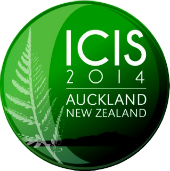IS Design Science
Engaged scholarship that combines inquiry with a potential for action and intervention embodies participative forms of research rests on the advice and perspectives of multiple stakeholders in understanding a complex social problem. Diverse forms of research and inquiry can be conducted within engaged frames. The track welcomes submissions from the entire range of alternatives that deal with the question of integrating inquiry with the potential of creating and shaping alternative futures. Specific interest is placed upon design research and design theorizing with respect to Information and Communication Technologies (ICT). Such design science embodies research which extends the boundaries of human and organizational capabilities by creating new and innovative artifacts. The building and application of these designed artifacts produces knowledge and understanding of a problem domain and its solutions, which is then potentially transferable to other domains. In design science, the engagement is primarily focused on the design and evaluation of an artifact; learning through building with the aim to generate theoretical insights. This is an iterative research process which capitalizes on learning via both researcher and subject expertise within the context of the participants' social system. It is a clinical method that puts IS researchers in an active supporting role towards practitioners. It therefore reveals how research knowledge can inform and be informed by practitioner settings. To this end we seek implementable and grounded action frames for engaging in such generalizable inquiries, as there is not a great deal of guidance on how to conduct such design research well.
The scope of this track includes research findings that arise from engaged approaches, studies of the practical use of design science approaches and their use to expand theory, and conceptual foundations that significantly and cogently expand our understanding of the epistemology and methodology of such approaches and their philosophical underpinnings.
Topics of interest include, but are not limited to:
1) Developing Design Artifacts and Design Theories
How can artifacts enhance organizational capabilities? Where does design theory originate? What alternative design processes exist and how can they be used in conjunction with design theories? Which innovations can serve service design? How to extract design principles from practice? How can theorizing in "normal science" lead to new design principles? What is the role of creativity in design science?
2) Evaluating and Testing Design Artifacts and Design Theories
What criteria should be used to evaluate designed artifacts and design theory? Are there different techniques for engaged evaluation of design artifacts when multiple stakeholders are present? What methods and form of inquiry can be used in evaluation? How well are design researchers evaluating their design ideas? Are ICT researchers building cumulative design theory? How much does our design research inform practice?
3) Different Approaches to Design Artifacts and Design Theories
Which different implementation methodologies exist for different contexts? Does the type of artifact matter for theorizing? Is design research in different sub-disciplines in ICT intrinsically different? What can we learn from other applied disciplines in engineering, medicine or social science? Must ICT design theory be underpinned by explanatory "kernel" theories from other ‘reference’ disciplines or are there genuine IS kernel theory? Do underlying philosophical positions matter in design research and how to triangulate across different paradigmatic positions?
Track Chairs
|
IT University of Copenhagen |
|
|
Case Western Reserve University |
Associate Editors
|
Robert Austin |
Copenhagen Business School |
|
Vladislav Fomin |
Vytautas Magnus University |
|
Ulrich Frank |
University of Duisburg-Essen |
|
Shirley Gregor |
Australian National University |
|
Roland Holten |
Goethe University |
|
Hemant Jain |
University of Wisconsin |
|
Dimitris Karagiannis |
University of Vienna |
|
Benn Konsynski |
Emory University |
|
Jan Marco Leimeister |
University of St. Gallen |
|
Rikard Lindgren |
University of Gothenburg |
|
Wolfgang Maass |
University of the Saarland |
|
Jan Muntermann |
Georg August University |
|
Satish Nambisan |
University of Wisconsin |
|
Jeffrey Nickerson |
Stevens Institute of Technology |
|
Yves Pigneur |
University of Lausanne |
|
Michael Rosemann |
Queensland University of Technology |
|
Tuure Tuunanen |
University of Jyvaskyla |



